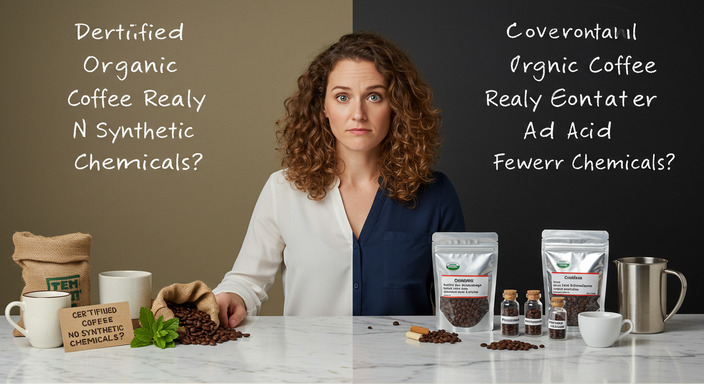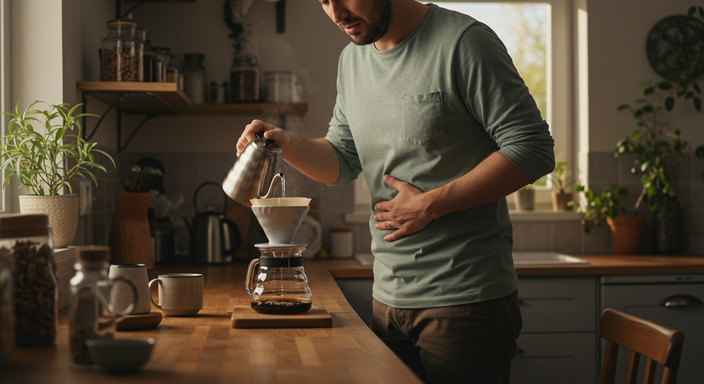
Does Organic Coffee Have Fewer Chemicals? A Clear Answer

Table of Contents
ToggleWhat is organic coffee?
Definition and Certification Standards
Organic coffee is more than just a label—it’s a commitment to sustainable and environmentally friendly farming practices. To be certified organic, coffee must be grown without the use of synthetic pesticides, herbicides, or chemical fertilizers. Instead, organic farmers rely on natural methods like composting, shade-growing, and crop rotation to maintain soil health and combat pests.
The certification process is rigorous and involves strict guidelines set by organizations such as the USDA (United States Department of Agriculture) in the U.S. or other international bodies like the EU Organic Certification. Farmers must also ensure their coffee is processed and stored without contamination from non-organic substances. This ensures that every cup of organic coffee you enjoy is cleaner and safer for both you and the planet.
How It Differs from Conventional Coffee
Conventional coffee farming often relies on synthetic chemicals to boost yields and protect crops from pests and diseases. While this may seem efficient, it can have long-term consequences for the environment, such as soil degradation, water contamination, and harm to wildlife. In contrast, organic coffee farming prioritizes sustainability and biodiversity, creating a healthier ecosystem.
Another key difference lies in the health benefits. Organic coffee is free from residual chemicals that can linger in conventionally grown beans. This makes it a healthier choice for consumers, especially for those who are sensitive to chemicals or prioritize clean eating. Additionally, organic coffee often supports fair trade practices, ensuring that farmers are paid fairly for their labor.
Here’s a quick comparison:
| Aspect | Organic Coffee | Conventional Coffee |
|---|---|---|
| Chemical Use | No synthetic pesticides or fertilizers | Often uses synthetic chemicals |
| Environmental Impact | Supports biodiversity and soil health | Can lead to soil degradation and pollution |
| Health Benefits | Free from chemical residues | May contain residual chemicals |
Choosing organic coffee means not only enjoying a cleaner, richer brew but also contributing to a more sustainable and ethical coffee industry.
Does organic coffee have fewer chemicals?
Pesticide Use in Organic vs. Conventional Farming
When it comes to coffee production, one of the most significant differences between organic and conventional farming lies in the use of pesticides. Conventional coffee farming often relies on synthetic pesticides and herbicides to protect crops from pests and weeds. These chemicals can leave residues on the beans, which may end up in your cup. On the other hand, organic coffee farming avoids synthetic pesticides altogether, opting for natural alternatives like compost, crop rotation, and beneficial insects to maintain soil health and deter pests.
By choosing organic coffee, you’re supporting farming practices that minimize chemical exposure, not just for you but also for the farmers and the environment. This approach promotes a healthier ecosystem, reduces soil and water contamination, and protects biodiversity.
Scientific Evidence and Studies
So, does organic coffee have fewer chemicals? Research suggests yes. Studies have shown that organic coffee beans generally contain lower levels of pesticide residues compared to conventionally grown beans. For example, a study published in the Journal of Agricultural and Food Chemistry found that organic coffee had significantly fewer residues of synthetic pesticides. This is a reassuring finding for those looking to reduce their exposure to potentially harmful substances.
Additionally, organic farming often emphasizes the use of shade-grown methods, which not only reduce the need for chemical inputs but also support bird habitats and biodiversity. While more research is needed to fully understand the long-term health and environmental impacts, the evidence so far points to clear benefits of choosing organic coffee.
Here’s a quick comparison of key differences:
| Aspect | Organic Coffee | Conventional Coffee |
|---|---|---|
| Pesticide Use | Natural alternatives only | Synthetic pesticides |
| Pesticide Residues | Lower levels | Higher levels |
| Environmental Impact | Eco-friendly, supports biodiversity | Potential contamination |
Health benefits of choosing organic coffee
Reduced exposure to harmful chemicals
One of the most compelling reasons to choose organic coffee is the significant reduction in exposure to harmful chemicals. Conventional coffee farming often relies on synthetic pesticides, herbicides, and fungicides, which can leave residue on the beans. Organic coffee, on the other hand, is grown without these synthetic chemicals, ensuring that your cup of coffee is as pure as nature intended. By opting for organic, you’re not just avoiding these substances in your drink but also supporting farming practices that are safer for the environment and farmers.
Consider this: the coffee bean is one of the most heavily sprayed crops in the world. When you choose organic, you’re saying no to chemicals like glyphosate, which has been linked to health concerns. This simple switch can make a big difference in reducing your overall chemical intake.
Potential long-term health impacts
Beyond the immediate benefits of reduced chemical exposure, organic coffee may contribute to long-term health benefits. Studies suggest that organic farming practices can lead to coffee beans with higher antioxidant levels, which are essential for combating oxidative stress in the body. Antioxidants help protect your cells from damage and may reduce the risk of chronic diseases over time.
Additionally, organic coffee is often free from mold and mycotoxins, which can develop on conventionally grown beans due to improper storage or processing. These toxins have been associated with negative health effects, including liver and kidney damage. By choosing organic, you’re prioritizing a cleaner, healthier brew that supports your well-being in the years to come.
Here’s a quick comparison of organic vs. conventional coffee:
- Organic Coffee: Free from synthetic pesticides, higher antioxidant content, lower risk of mold and mycotoxins.
- Conventional Coffee: May contain chemical residues, lower antioxidant levels, higher risk of mold and mycotoxins.
Making the switch to organic coffee isn’t just a choice for today—it’s an investment in your long-term health and the health of the planet.
Environmental Impact of Organic Coffee
Sustainable Farming Practices
One of the most significant ways organic coffee benefits the environment is through its use of sustainable farming practices. Organic coffee is grown without synthetic pesticides or fertilizers, which are often harmful to the soil and surrounding ecosystems. Instead, farmers rely on natural methods like composting, crop rotation, and shade-grown techniques. These practices not only reduce environmental pollution but also help conserve water and maintain soil fertility over time.
For example, shade-grown coffee preserves native trees and plants, creating a more balanced ecosystem. This method reduces the need for deforestation, which is a common issue in conventional coffee farming. By choosing organic coffee, you’re supporting farming methods that work in harmony with nature rather than depleting it.
Benefits for Biodiversity
Organic coffee farms are havens for biodiversity. Since these farms avoid synthetic chemicals, they provide a safer habitat for birds, insects, and other wildlife. Studies have shown that organic coffee plantations host a greater variety of species compared to conventional farms. The shade trees used in organic farming often attract migratory birds and other pollinators, which play a crucial role in maintaining ecological balance.
Additionally, organic farms tend to grow other crops alongside coffee plants, further promoting biodiversity. This polyculture approach reduces the risk of pests and diseases, creating a more resilient ecosystem. By supporting organic coffee, you’re indirectly contributing to the preservation of diverse plant and animal life.
Soil Health and Regeneration
Soil is the foundation of any farm, and organic coffee farming takes great care to protect and regenerate it. Natural processes like composting enrich the soil with essential nutrients, while crop rotation prevents soil degradation. Unlike conventional farming, which often leads to soil erosion and nutrient depletion, organic practices ensure that the soil remains healthy and productive for years to come.
Healthy soil also has a remarkable ability to absorb and store carbon, helping to combat climate change. Organic farming enhances this capacity, making it a powerful tool in reducing greenhouse gas emissions. When you enjoy a cup of organic coffee, you’re not just savoring its rich flavor—you’re also supporting methods that nurture the earth.
Ethical considerations of organic coffee
Fair trade and farmer support
When you choose organic coffee, you’re often supporting more than just your morning routine—you’re contributing to a system that values fair wages and humane working conditions for farmers. Many organic coffee brands are Fair Trade certified, which means they adhere to strict standards ensuring that farmers receive a fair price for their crops. This helps small-scale farmers sustain their livelihoods and invest in their communities. For example, Fair Trade premiums can fund schools, healthcare, and better farming equipment. By opting for organic and Fair Trade coffee, you’re directly supporting a more equitable global economy.
- Fair wages: Farmers earn a living wage, reducing exploitation.
- Community development: Profits often fund local projects like schools and clean water initiatives.
- Sustainable practices: Farmers are encouraged to use eco-friendly methods, benefiting both their land and the planet.
Transparency in the supply chain
One of the hallmarks of organic coffee is its commitment to transparency. Unlike conventional coffee, where the journey from farm to cup can be murky, organic coffee brands often prioritize traceability. This means they provide detailed information about where the coffee is grown, who grew it, and how it was processed. This level of openness ensures that consumers can make informed choices and trust that their purchase aligns with their values. For instance, many companies share stories about the farms and farmers behind their beans, fostering a deeper connection between consumers and producers.
| Conventional Coffee | Organic Coffee |
|---|---|
| Often lacks detailed sourcing information | Provides transparent supply chain details |
| Focuses on volume over quality | Emphasizes sustainable and ethical practices |
“When you know where your coffee comes from, every sip feels more meaningful.”
How to Identify and Choose Organic Coffee
Certifications to Look For
When shopping for organic coffee, certifications are your best guide. These labels ensure the coffee meets strict organic farming and production standards. Here are the key certifications to look for:
- USDA Organic: This is the gold standard in the U.S. It guarantees the coffee is grown without synthetic pesticides, herbicides, or fertilizers.
- Fair Trade Certified: While not exclusively organic, this label ensures ethical farming practices, fair wages, and often aligns with organic standards.
- Rainforest Alliance Certified: This certification promotes sustainable farming, biodiversity, and environmental protection, often alongside organic practices.
- CCOF (California Certified Organic Farmers): A rigorous certification that ensures organic integrity and sustainable practices.
Always check the packaging for these certifications to ensure you’re buying genuine organic coffee.
Tips for Finding Trustworthy Brands
Choosing the right organic coffee brand can feel overwhelming, but these tips can help you make an informed decision:
- Research the Brand: Look into the company’s values, sourcing practices, and transparency. Brands that share their farming methods and supplier partnerships are often more trustworthy.
- Read Reviews: Customer reviews can provide insights into the coffee’s quality, taste, and the brand’s commitment to organic standards.
- Buy Directly from Roasters: Many small-batch roasters source their beans directly from organic farms, ensuring quality and traceability.
- Check for Freshness: Look for roast dates on the packaging. Freshly roasted coffee not only tastes better but is also more likely to retain its organic integrity.
- Support Local: Local coffee shops and roasters often carry organic options and can provide detailed information about their products.
By taking these steps, you can confidently select a brand that aligns with your health, ethical, and environmental values.
Final Thoughts and Call to Action
Why Organic Coffee is Worth the Investment
Choosing organic coffee is more than just a personal preference—it’s a commitment to your health, the environment, and ethical farming practices. Organic coffee is grown without synthetic pesticides or fertilizers, which means fewer chemicals in your cup and a lower environmental impact. While it may cost a bit more, the benefits far outweigh the price difference. You’re not just buying coffee; you’re supporting sustainable agriculture, protecting biodiversity, and ensuring fair wages for farmers.
When you invest in organic coffee, you’re also making a statement about the kind of world you want to live in. It’s a small but powerful way to align your daily habits with your values. Every sip becomes a reminder that your choices matter.
Encouragement to Make Conscious Consumer Choices
As consumers, we have the power to shape industries and practices through our buying decisions. By choosing organic coffee, you’re voting for a healthier planet and a more equitable food system. It’s a simple yet impactful step toward living more consciously.
Here are a few ways to make your coffee habits more sustainable:
- Look for certifications like USDA Organic and Fair Trade to ensure the coffee meets high ethical and environmental standards.
- Support local roasters and brands that prioritize sustainability.
- Consider using reusable coffee filters or compostable pods to reduce waste.
Every choice counts. Whether you’re a seasoned coffee lover or just starting to explore organic options, your decisions can make a difference. Let’s brew a better future, one cup at a time.
FAQ
Is organic coffee better for the environment? Yes, organic farming practices reduce pollution, conserve water, and promote soil health, making it a more sustainable choice. Does organic coffee taste different? Many people find that organic coffee has a cleaner, more vibrant flavor because it’s grown in healthier soils without synthetic chemicals. Is organic coffee worth the higher price? Absolutely. The benefits to your health, the environment, and the livelihoods of farmers make it a worthwhile investment.
is a writer and editor at Coffee With Finance, blending her love for coffee, personal finance, and visual storytelling. She crafts engaging articles, curates site images, and shares brewing tips, bean origins, and practical money advice. Anna believes that managing finances, like making great coffee, should be intentional and rewarding — bringing clarity, warmth, and beauty to every story she tells.




























Post Comment